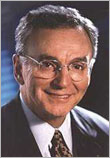|

Remarks

 |
Dr. Joseph Bordogna
Deputy Director and Chief Operating Officer
National Science Foundation
Biography
Remarks
Presidential Awards for Excellence in Science, Mathematics, and Engineering Mentoring
May 17, 2005
|
Good morning to all of you. I have the honor of greeting you for a second time, and the distinct pleasure of telling you how truly inspiring you are. An anonymous scholar once said, "Great mentors never strive to explain their visions -- they simply invite us to stand beside them and see for ourselves." It is truly inspiring for me to stand among you today.
Yesterday, we celebrated your achievements. Each of you received a well-deserved presidential award for your excellence in mentoring.
You are here today to do one of the things you do best: mentoring. A successful learning experience is giving and taking in a spirit of mutual compassion and civility; it is, in essence, a partnership. We learn from those we mentor as much as they learn from us. Today, you will begin to learn from each other how you each pursue the purpose and process of mentoring, and explore ways to bring the joy of mentoring to others. We hope this interaction will grow robustly into the future.
As I mentioned yesterday, your work is serious business -- for those you mentor and for the nation. I want to expand on this two-fold value you contribute to learning.
The value you bring to students and others is not imparting facts and content, though that is surely important. And it isn't principally instilling broader skills, though that is significant as well. Mentoring is the much more difficult -- and rewarding -- process of discovering, through interaction, the wellspring of a student’s curiosity and enthusiasm, and then nourishing both.
The late Nathan Pusey, Harvard's long-serving President during the nineteen fifties and sixties, put it this way: "through sympathy, emotion, imagination and patience, to awaken in the learner the restless drive for answers and insights which enlarge the personal life and give it meaning."1 That is what you do, and you are the best there are! Today, we might call this "sustainable" learning -- learning that ultimately rests on a personal quest, a mission that lasts a lifetime.
I know from my own experience that mentoring takes place in almost as many ways as there are mentors. That isn't surprising once we recognize that each mentor brings something personal and therefore authentic to the partnership. This facet of mentoring, more than any rubric or rules, is what helps those you mentor flourish and awakens their talents.
As if inspiring such a quest in students were not enough, you also bring enormous value to the nation. As you all well believe, science, mathematics, engineering and technology play an ever-expanding role in our contemporary society. Every citizen needs capacity and skill in these areas to participate fully in the life of the nation -- both in order to contribute to our common prosperity and to enjoy its benefits.
These capabilities and skills cannot be acquired through production-line education that turns students into commodities. We want to create an educational environment that attracts and encourages students from the nation's full diversity of talent. We want to inspire them to pursue studies in science and engineering and help them to stay the course. We want them to fully realize their respective talents and aspirations.
You have done this brilliantly. Now we need to find ways and means to make this the vanguard of a larger revolution in education that will rally still more educators and researchers behind the mentoring banner. Your work today and beyond can do just that. We need you to stay connected and create a mentoring movement that is greater and more widespread than your individual experiences.
Again, it is a privilege to stand among you as you carry out your vision and your commitment to innovative learning. Thank you for your diligence and your determination to transform our nation's future.

1 Nathan M. Pusey, Former President, Harvard; NY Times 22 March 1959.
Return to speech.

Return to a list of Dr. Bordogna's speeches.
|











